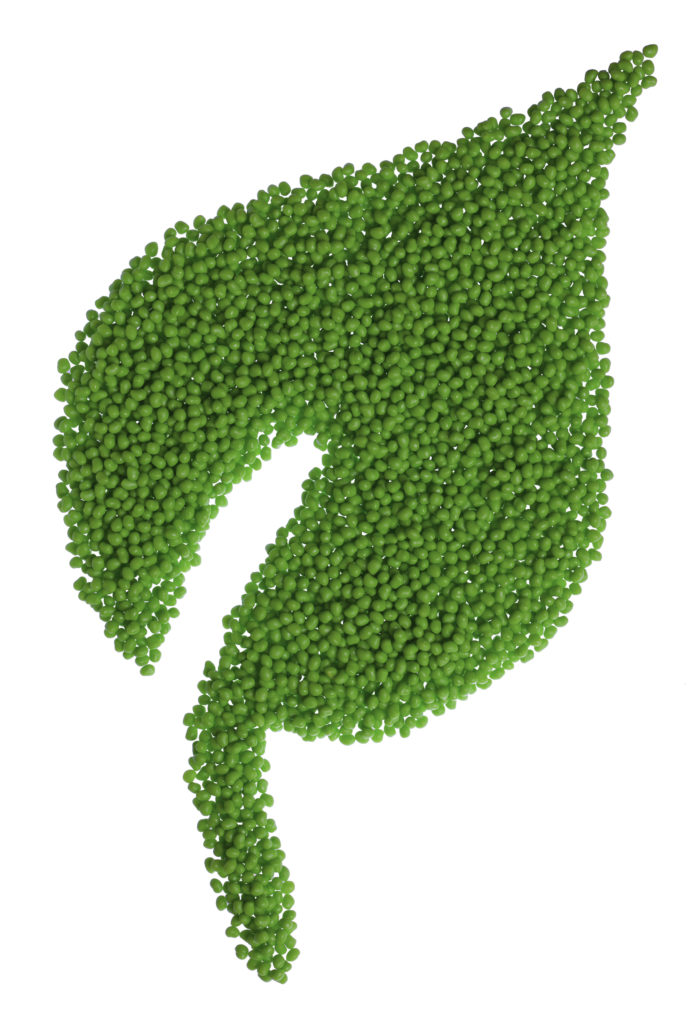
Hexpol TPE have added more grades to their Dryflex Green family of biobased TPE compounds. The series now includes grades based on styrenic block copolymer (TPS) and thermoplastic polyolefin (TPO) technologies, with amounts of renewable content to over 90 % (ASTM D 6866-12) and hardness from 15 Shore A to 60 Shore D.
Dryflex Green TPE compounds contain raw materials from renewable resources such as plant and vegetable crops. The biobased content can derive from various raw materials such as polymers, fillers, plasticisers or additives, coming from renewable sources such as products and by-products from agricultural that are rich in carbohydrates, especially saccharides.
Dryflex Green TPEs can usually be used as a drop-in solution, without the need for tool modifications. They display mechanical and physical properties comparable to TPE compounds from fossil based raw materials. They also show very good bonding behaviour to PE and PP, with special grades for bonding to ABS, PC/ABS and PET.
Dryflex Green TPEs are recyclable, they are easy to colour, and grades are available with raw materials that are compliant with food contact regulations.
Speaking about the development, Klas Dannäs, Global R&D Manager Hexpol TPE commented “This is part of our ongoing commitment to bring new possibilities for sustainability to the market. Alongside our TPEs with recycled content and biocomposite compounds, we are developing an extensive portfolio of resource saving materials. We continue to trial new and emerging raw material combinations and further test the possibilities of Dryflex Green TPE compounds”.

Additional testing for automotive interiors
Alongside their sustainability credentials, materials used for automotive interiors also need to meet requirements for Vehicle Interior Air Quality (VIAQ) and legislation regarding odour, fogging and VOC. To help automotive players meet these dual demands, Hexpol TPE has carried out odour and fogging tests on representative Dryflex Green grades. The results demonstrate their low emissions performance, for example a 75 Shore A Dryflex Green compound with a renewable content of 20 % showed a very low amount of VOC (42.8 μg/g) and Fog (474 μg/g) in the thermodesorption test according to VDA 278 and odour 3.0 in VDA 270 C3 test.
Dryflex Green TPEs can be used in automotive interior applications such as floor mats, cup holder liners, fascia, trim and inlay mats.
Tab. 1: Representative Dryflex Green TPS grades with over 20% bio-content
| Grade | Hardness1 ISO 868 Shore A |
Density ISO 2781 g/cm3 |
Tensile Strength2 ISO 37 Type 1MPa |
Stress at 100% Strain2 ISO 37 Type 1 MPa |
Elongation at Break2 ISO 37 Type 1 % |
Tear Strength2 ISO 34-1 Method C N/mm |
Biobased Carbon Content ASTM 6866-12 % of TOC |
Gravimetric Fogging ISO 6452 100°C / 16h mg |
| Dryflex SE 60A25G1N A | 60 | 0.90 | 4.4 | 1.6 | > 650 | 19 | 25 | 0.39 |
| Dryflex SE 70A28G1N A | 70 | 0.90 | 4.6 | 2.0 | > 700 | 21 | 28 | 0.44 |
| Dryflex SE 80A28G1N A | 80 | 0.90 | 5.2 | 2.6 | > 650 | 29 | 28 | – |
| Dryflex SE 60A25G2N A | 60 | 1.09 | 4.2 | 1.5 | > 750 | 17 | 25 | 0.44 |
| Dryflex SE 70A26G2N A | 70 | 1.09 | 4.6 | 1.8 | > 600 | 16 | 26 | – |
| Dryflex SE 80A27G2N A | 80 | 1.09 | 5.5 | 2.4 | > 550 | 23 | 27 | – |
| 1 After 15 seconds 2 Across the flow direction |
||||||||
Tab. 2: Representative Dryflex Green TPS grades with over 60% bio-content
| Grade | Hardness1 ISO 868 Shore A |
Density ISO 2781 g/cm3 |
Tensile Strength2 ISO 37 Type 1 MPa |
Stress at 100% Strain2 ISO 37 Type 1 MPa |
Elongation at Break2 ISO 37 Type 1 % |
Tear Strength2 ISO 34-1 Method C N/mm |
Biobased Carbon Content ASTM 6866-12 % of TOC |
Gravimetric Fogging ISO 6452 100°C / 16h mg |
| Dryflex SC 60A64G1N A | 60 | 0.89 | 3.1 | 1.9 | > 400 | 20 | 64 | 0.53 |
| Dryflex SC 70A63G1N A | 70 | 0.89 | 3.8 | 2.8 | > 350 | 27 | 63 | – |
| Dryflex SC 80A65G1N A | 80 | 0.89 | 4.4 | 3.2 | > 450 | 33 | 65 | 0.57 |
| 1 After 15 seconds 2 Across the flow direction |
||||||||
Tab. 3: Representative Dryflex Green TPS grades with over 80% bio-content
| Grade | Hardness1 ISO 868 Shore A |
Density ISO 2781 g/cm3 |
Tensile Strength2 ISO 37 Type 1 MPa |
Stress at 100% Strain2 ISO 37 Type 1 MPa |
Elongation at Break2 ISO 37 Type 1 % |
Tear Strength2 ISO 34-1 Method C N/mm |
Biobased Carbon Content ASTM 6866-12 % of TOC |
Gravimetric Fogging ISO 6452 100°C / 16h mg |
| Dryflex SC 50A82G1N A | 50 | 0.90 | 4.5 | 1.5 | > 600 | 19 | 82 | 0.54 |
| Dryflex SC 60A82G1N A | 60 | 0.90 | 4.9 | 1.9 | > 750 | 32 | 82 | 0.68 |
| Dryflex SC 70A83G1N A | 70 | 0.90 | 5.3 | 2.8 | > 750 | 35 | 83 | 0.95 |
| Dryflex SC 80A84G1N A | 80 | 0.90 | 5.6 | 3.5 | > 800 | 40 | 84 | 0.96 |
| Dryflex SC 50A82G2N A | 50 | 0.98 | 4.0 | 1.3 | > 600 | 24 | 82 | 0.43 |
| Dryflex SC 80A84G2N A | 80 | 0.98 | 5.0 | 3.3 | > 600 | 38 | 84 | 0.91 |
| 1 After 15 seconds 2 Across the flow direction |
||||||||
